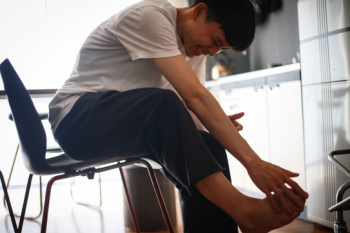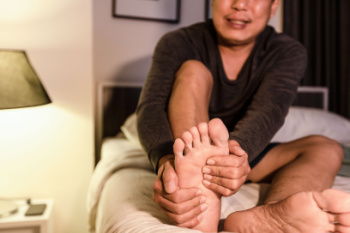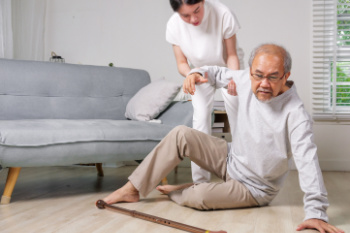

Gout is a painful form of inflammatory arthritis that can affect anyone but is more prevalent in men. It results from the buildup of uric acid in the blood, which leads to the formation of sharp crystals within the joints. The big toe is often the first joint to be affected, but gout inflammation can also flare up in the ankles, knees, wrists, and fingers. Symptoms of gout usually come on suddenly, often at night, and can include excruciating pain, redness, swelling, and extreme tenderness in the affected joint. The pain can be so severe that even the touch of a bedsheet may feel unbearable. Without treatment, these painful episodes can last for days, and over time, the frequency and intensity of attacks may increase. A podiatrist can provide a thorough diagnosis and recommend effective treatments to manage this condition and prevent further joint damage. If you are experiencing flares of gout, it is suggested that you make an appointment with a podiatrist for treatment.
Gout is a foot condition that requires certain treatment and care. If you are seeking treatment, contact Dr. Nooshin Zolfaghari from VIP Foot & Ankle Center. Our doctor will treat your foot and ankle needs.
What Is Gout?
Gout is a type of arthritis caused by a buildup of uric acid in the bloodstream. It often develops in the foot, especially the big toe area, although it can manifest in other parts of the body as well. Gout can make walking and standing very painful and is especially common in diabetics and the obese.
People typically get gout because of a poor diet. Genetic predisposition is also a factor. The children of parents who have had gout frequently have a chance of developing it themselves.
Gout can easily be identified by redness and inflammation of the big toe and the surrounding areas of the foot. Other symptoms include extreme fatigue, joint pain, and running high fevers. Sometimes corticosteroid drugs can be prescribed to treat gout, but the best way to combat this disease is to get more exercise and eat a better diet.
If you have any questions please feel free to contact our office located in Pembroke Pines, FL . We offer the newest diagnostic and treatment technologies for all your foot and ankle needs.

Foot surgery to remove a corn is a common procedure aimed at alleviating pain and discomfort. A corn, which is a thickened area of skin usually caused by friction or pressure, can be effectively addressed through this surgical intervention. The procedure begins with a local anesthetic to numb the area, ensuring the patient feels no pain. The podiatric surgeon then makes a small incision to carefully remove the corn and any surrounding thickened skin. The underlying cause, such as wearing ill-fitting shoes or structural abnormalities, is often evaluated to prevent recurrence. Post-surgery, the area is dressed and a follow-up is scheduled to monitor healing and ensure no complications arise. If you have a painful corn on your foot that is causing pain and discomfort, it is suggested that you consult a podiatrist who can determine if surgical removal is right for you.
Foot surgery is sometimes necessary to treat a foot ailment. To learn more, contact Dr. Nooshin Zolfaghari of VIP Foot & Ankle Center. Our doctor will assist you with all of your foot and ankle needs.
When Is Surgery Necessary?
Foot and ankle surgery is generally reserved for cases in which less invasive, conservative procedures have failed to alleviate the problem. Some of the cases in which surgery may be necessary include:
What Types of Surgery Are There?
The type of surgery you receive will depend on the nature of the problem you have. Some of the possible surgeries include:
Benefits of Surgery
Although surgery is usually a last resort, it can provide more complete pain relief compared to non-surgical methods and may allow you to finally resume full activity.
Surgical techniques have also become increasingly sophisticated. Techniques like endoscopic surgery allow for smaller incisions and faster recovery times.
If you have any questions please feel free to contact our office located in Pembroke Pines, FL . We offer the newest diagnostic and treatment technologies for all your foot and ankle needs.

Diabetic neuropathy is a serious complication of diabetes that results from nerve damage caused by prolonged high blood sugar and elevated blood fats. This condition often targets the nerves in the lower legs and feet, leading to what is known as peripheral neuropathy. Studies show that between one-third and one-half of people with diabetes will experience this condition. Diabetic neuropathy can bring on a range of uncomfortable symptoms, including numbness and weakness, burning, tingling, and pain in the lower limbs. Additionally, the diminished sensation can make you more susceptible to unnoticed wounds on your feet, which increases the risk of infections and complications. To manage diabetic neuropathy effectively, it is suggested you schedule an appointment with a podiatrist, ensuring that any potential issues are caught early and treated appropriately.
Neuropathy
Neuropathy can be a potentially serious condition, especially if it is left undiagnosed. If you have any concerns that you may be experiencing nerve loss in your feet, consult with Dr. Nooshin Zolfaghari from VIP Foot & Ankle Center. Our doctor will assess your condition and provide you with quality foot and ankle treatment for neuropathy.
What Is Neuropathy?
Neuropathy is a condition that leads to damage to the nerves in the body. Peripheral neuropathy, or neuropathy that affects your peripheral nervous system, usually occurs in the feet. Neuropathy can be triggered by a number of different causes. Such causes include diabetes, infections, cancers, disorders, and toxic substances.
Symptoms of Neuropathy Include:
Those with diabetes are at serious risk due to being unable to feel an ulcer on their feet. Diabetics usually also suffer from poor blood circulation. This can lead to the wound not healing, infections occurring, and the limb may have to be amputated.
Treatment
To treat neuropathy in the foot, podiatrists will first diagnose the cause of the neuropathy. Figuring out the underlying cause of the neuropathy will allow the podiatrist to prescribe the best treatment, whether it be caused by diabetes, toxic substance exposure, infection, etc. If the nerve has not died, then it’s possible that sensation may be able to return to the foot.
Pain medication may be issued for pain. Electrical nerve stimulation can be used to stimulate nerves. If the neuropathy is caused from pressure on the nerves, then surgery may be necessary.
If you have any questions, please feel free to contact our office located in Pembroke Pines, FL . We offer the newest diagnostic and treatment technologies for all your foot care needs.

As people age, changes in the feet can significantly impact balance and increase the risk of falling. Structural changes such as reduced fat padding and thinning skin can make the feet more sensitive to pressure and less able to cushion impacts. Arthritis and joint stiffness can affect mobility and stability, altering gait patterns and making it harder to maintain balance. Neuropathy, or nerve damage, can diminish sensation in the feet, impairing the ability to detect uneven surfaces or obstacles. Additionally, foot conditions like bunions or hammertoes can affect alignment and stride, further compromising stability. To reduce the risk of falling, older adults should prioritize foot care, including regular check-ups with a podiatrist, wearing supportive footwear with good traction, and performing exercises to improve strength, flexibility, and balance. If you are elderly and have foot pain, it is strongly suggested that you are under the care of of a podiatrist who can treat various foot conditions and guide you on how to strengthen your feet.
Preventing falls among the elderly is very important. If you are older and have fallen or fear that you are prone to falling, consult with Dr. Nooshin Zolfaghari from VIP Foot & Ankle Center. Our doctor will assess your condition and provide you with quality advice and care.
Every 11 seconds, an elderly American is being treated in an emergency room for a fall related injury. Falls are the leading cause of head and hip injuries for those 65 and older. Due to decreases in strength, balance, senses, and lack of awareness, elderly persons are very susceptible to falling. Thankfully, there are a number of things older persons can do to prevent falls.
How to Prevent Falls
Some effective methods that older persons can do to prevent falls include:
Falling can be a traumatic and embarrassing experience for elderly persons; this can make them less willing to leave the house, and less willing to talk to someone about their fears of falling. Doing such things, however, will increase the likelihood of tripping or losing one’s balance. Knowing the causes of falling and how to prevent them is the best way to mitigate the risk of serious injury.
If you have any questions, please feel free to contact our office located in Pembroke Pines, FL . We offer the newest diagnostic and treatment technologies for all your foot care needs.